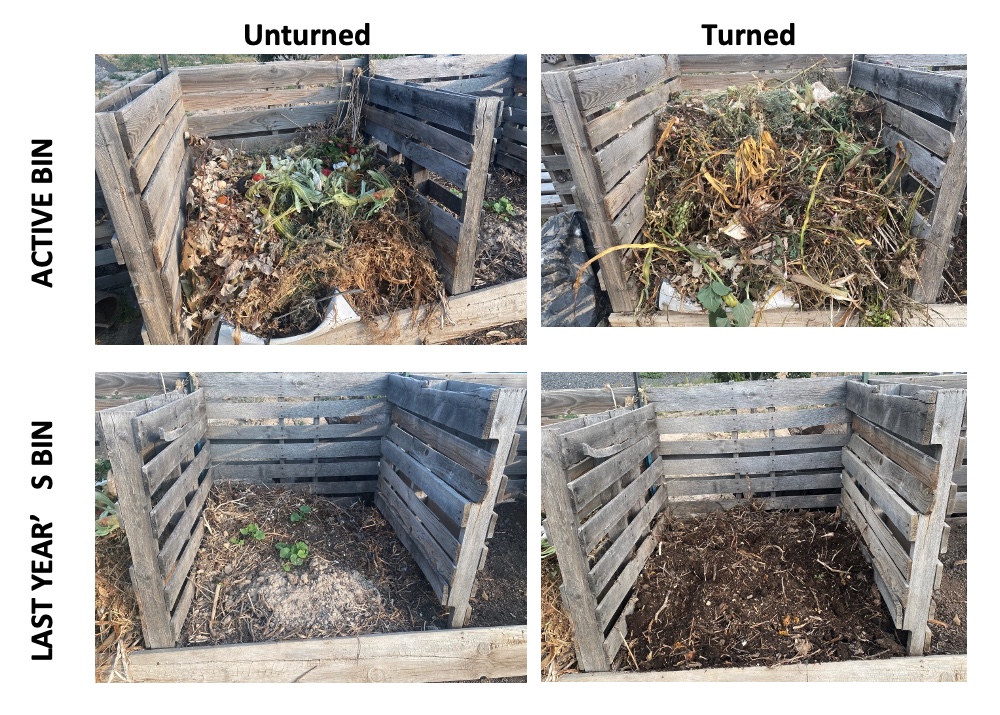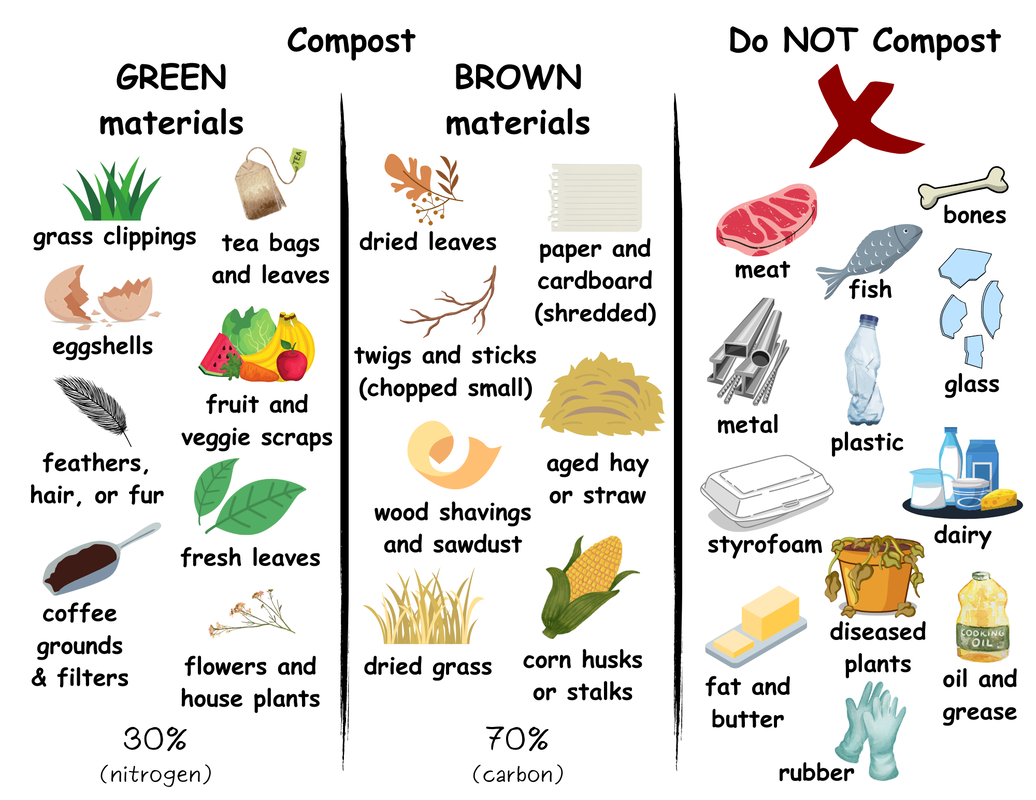What Three Items Should Not Be Placed in a Compost Pile? Essential Tips for Successful Composting

Composting is an eco-friendly way to recycle organic waste and enrich soil, but not all materials are suitable for the compost pile. Understanding what items can hinder the composting process is crucial for achieving optimal results. In this article, we will explore three specific items that should never be placed in a compost pile. By avoiding these common pitfalls, you can ensure a successful composting experience and contribute positively to the environment. Discover essential tips to enhance your composting efforts and create a nutrient-rich amendment for your garden.
What Three Items Should Not Be Placed in a Compost Pile?
When creating a compost pile, it's essential to know which materials are unsuitable, as they can disrupt the composting process or result in harmful effects. Three items that should never be included in a compost pile are meat, dairy products, and glossy paper. Meat and dairy can attract unwanted pests and produce unpleasant odors due to their high-fat content, while glossy paper often contains chemicals and coatings that can leach into the compost, making it contaminated and unsafe for gardening use.
Meat Products
Including meat in your compost pile is a bad idea because it attracts pests such as rodents and flies. These unwanted visitors not only disrupt the composting process but can also lead to unsanitary conditions. The decomposition of meat generates foul odors that make it unappealing to handle and can also cause contamination of your compost, ultimately harming the health of your plants.
Dairy Products
Similar to meat, dairy products such as milk, cheese, and butter should be avoided in compost heaps. Their high fat and protein content can promote the growth of harmful bacteria, contributing to unpleasant smells and attracting rodents. Composting dairy can lead to an imbalance in your compost pile, causing it to become anaerobic, which hampers the breakdown of organic matter and results in a poor-quality end product.
Glossy Paper
Glossy paper, often found in magazines and promotional materials, is harmful to compost because it usually contains chemical coatings and inks that do not break down naturally in the composting process. These harmful substances can contaminate your compost, posing a potential threat to soil and plant health. Instead, stick to uncoated paper products, which decompose effectively and contribute positively to your compost.
Weeds and Invasive Plants
Although some people might think that composting weeds is a good way to dispose of them, this can actually backfire. Many weeds can survive the composting process and may germinate once you introduce the compost to your garden, leading to an even greater weed problem. It’s crucial to avoid adding invasive plant species that may spread and disrupt local ecosystems.
Pet Waste
Composting pet waste is highly discouraged due to the potential presence of pathogens that could harm human health. Even if you’re adding cat or dog waste to a hot compost pile, the temperatures may not reach levels high enough to safely kill off harmful bacteria and parasites. Therefore, it’s best to dispose of pet waste through proper sanitation methods rather than putting it in your compost.
| Item | Reason to Avoid |
|---|---|
| Meat | Attracts pests and produces odors |
| Dairy Products | Encourages bacteria growth and unpleasant smells |
| Glossy Paper | Contains chemicals that contaminate compost |
| Weeds | May survive and regrow in the garden |
| Pet Waste | Contains pathogens harmful to human health |
How do you ruin a compost pile?


To ruin a compost pile, there are several practices and mismanagement techniques that can lead to its failure. Composting can be a rewarding and environmentally friendly process, but if not executed correctly, it can result in odors, pests, and long breakdown times. Here are some common ways to ruin a compost pile:
Improper Ratios of Green and Brown Materials
Maintaining a proper balance between green materials (nitrogen-rich) and brown materials (carbon-rich) is crucial for composting success. An excess of one type can hinder the microbial activity necessary for decomposition, leading to poor results.
- Too Much Green Material: This can create a soggy pile that is smelly and attracts pests.
- Too Much Brown Material: A lack of nitrogen can lead to a slow breakdown and a dry, non-functional compost pile.
- Proper Balance: The ideal ratio is often cited as 30 parts carbon to 1 part nitrogen.
Adding Contaminated or Unwanted Materials
Incorporating inappropriate items into your compost can ruin the efficacy and safety of the pile. Certain materials can introduce toxins or undesirable substances into the compost mix.
- Meat and Dairy: These attract pests and can lead to unpleasant odors.
- Diseased Plants: These can spread infections and pests to your garden.
- Pesticides and Chemicals: These can contaminate the compost, making it unsafe for plants.
Inadequate Aeration and Turning
Oxygen is essential for the aerobic decomposition process. Without proper aeration, the compost may become anaerobic, leading to foul odors and slower breakdown.
- Lack of Turning: Failing to turn the pile regularly can compact the materials, reducing airflow.
- Overly Dense Material: Packing materials too tightly can inhibit oxygen flow.
- Regular Aeration: Aim to turn your compost every few weeks to maintain good airflow.
Ignoring Moisture Levels
Moisture is another crucial factor in the composting process. Too much or too little can significantly impact the effectiveness of decomposition.
- Excess Water: A wet compost pile can become waterlogged, leading to odors and reducing microbial activity.
- Too Dry: Insufficient moisture can slow down the decomposition process and make it difficult for microbes to thrive.
- Ideal Moisture: The compost should feel like a damp sponge—moist but not soggy.
Neglecting Temperature Management
The temperature of the compost pile plays a significant role in the breakdown of organic matter. Ignoring temperature can lead to inefficiency.
- Low Temperatures: Composting may halt if the pile is too cold, causing slow decomposition.
- High Temperatures: If the pile is too hot and not managed, it can kill beneficial microorganisms.
- Monitoring Temperature: Using a compost thermometer can help maintain the desired thermophilic temperatures (between 130°F and 160°F).
What vegetables not to put in compost?

What vegetables should not be put in compost? Composting is a great way to recycle organic waste, but not all vegetables are suitable for composting. Certain types of vegetables can attract pests, create unpleasant odors, or slow down the composting process. Here's a detailed discussion on the vegetables you should avoid putting in your compost pile.
See also:
1. Vegetables That Attract Pests
Some vegetables are known to attract unwanted pests and insects to your compost pile, which can lead to an imbalance in your compost ecosystem. Avoid composting these types of vegetables:
- Cucumbers - They can attract fruit flies.
- Tomatoes - The smell can invite rodents.
- Potatoes - They may attract pests that want to feed on them.
2. Starchy Vegetables
Starchy vegetables like potatoes and corn can create a problem in your compost pile by slowing down the decomposition process. High starch content can lead to an unwanted buildup in the compost. It's better to limit or avoid these vegetables:
- Potatoes - Decomposition is slower due to starch content.
- Sweet Corn - Similar to potatoes, they add starchy mass.
- Peas - While they decompose, they can create excessive heat.
3. Oily and Fat-Rich Vegetables
Vegetables with high oil content can interfere with the composting process by creating a greasy layer that can work against aeration. Such materials are typically better suited for other disposal methods:
- Avocados - Their oily nature can lead to odor issues.
- Olive oil-soaked vegetables - Oils will inhibit microbial activity.
- Coconuts - Their rich oils can make compost too dense.
4. Cooked Vegetables
Cooked vegetables, especially those seasoned with oils, sauces, or spices, can introduce unwanted bacteria or pests into your compost. They can also produce foul odors as they break down:
- Leftover cooked carrots - They may attract flies and rodents.
- Cooked cabbage - Can emit strong odors during decomposition.
- Seasoned cooked potatoes - The spices may affect compost microbial balance.
5. Cruciferous Vegetables
Cruciferous vegetables, such as cabbages, can also create issues in compost due to their strong odors. While they can technically be composted, they are often best avoided:
- Broccoli - Its decomposition can lead to strong smells.
- Cabbage - Produces odors that may attract pests.
- Brussels Sprouts - Similar to cabbage, they can create odor issues.
Questions from Our Readers
What are the three items that should not be placed in a compost pile?
Placing certain items in a compost pile can lead to problems in the composting process. The three main items to avoid are meat, dairy products, and oils. These items can attract pests, produce odors, and create an imbalance in the compost's temperature and microbial activity.
Why is meat not suitable for composting?
Meat is not suitable for composting because it tends to attract animals and pests, causing disruption in your compost pile. Moreover, it can lead to bad odors as it decomposes, making it less appealing for gardeners and potentially spreading pathogens.
Can dairy products be composted?
Dairy products, like cheese and milk, should be excluded from compost piles as they can lead to foul smells and invite unwanted pests. Additionally, the breakdown of dairy in compost may create an environment that favors harmful bacteria, which can compromise the quality of the compost.
See also:
What about oils and fats in compost?
Oils and fats should also be kept out of compost piles because they can create a water-repellent barrier that disrupts the composting process. This barrier can hinder the breakdown of other materials and lead to anaerobic conditions, causing unwanted odors and slowing down nutrient recycling.

If you want to read more articles like What Three Items Should Not Be Placed in a Compost Pile? Essential Tips for Successful Composting, we recommend you check out our Compost category.
Leave a Reply
Related Articles